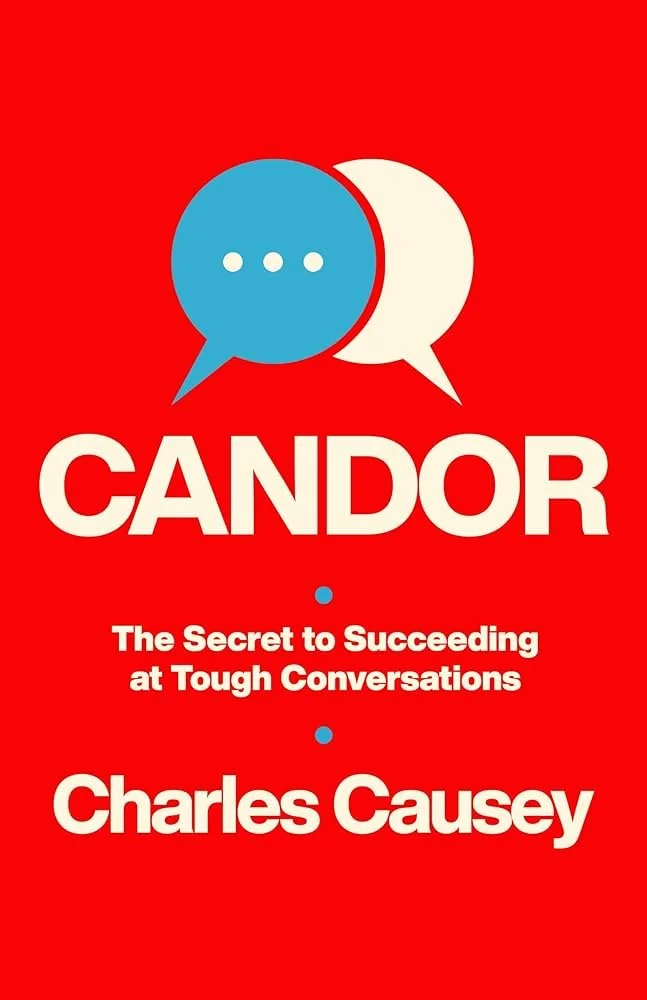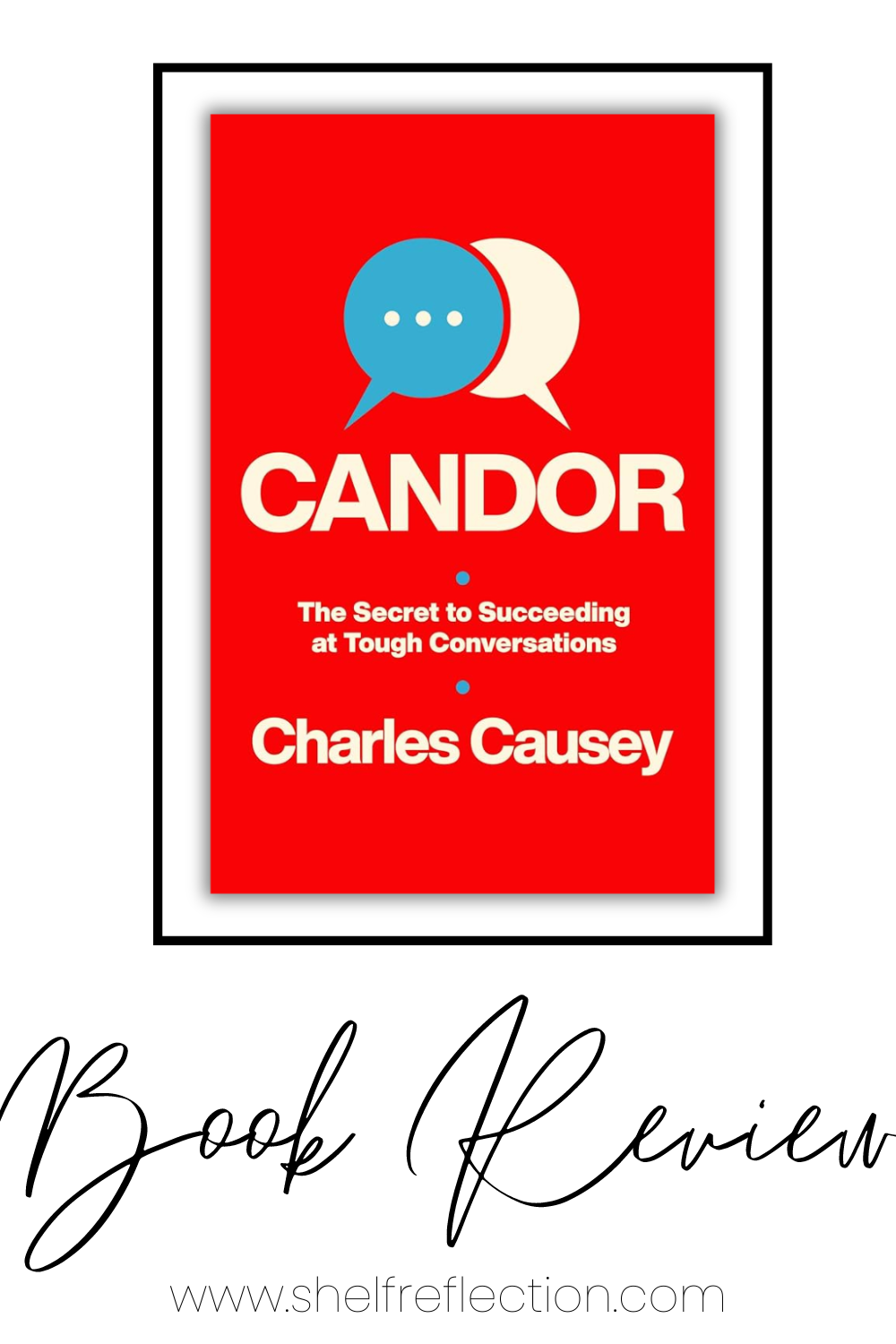Candor
Candor: The Secret to Succeeding at Tough Conversations
By: Charles Causey
“Candor helps us build relationships because it requires us to be courageous, vulnerable, and willing to offer feedback. It leverages openness and honesty to increase trust.”
If you came to this book to read about one of the five factions of the Divergent series, you’ve got the wrong book, but if you’d like to learn more about candor and how to use honesty and transparency to benefit your relationships, your home, and your workplace, then you’ve come to the right place!
“My goal in writing this book is for the reader to learn to overcome personal fears and cynicism when speaking and to develop skills in wielding candor so that it becomes habitual and others-centered. My goal is also for leaders to learn to be willing to hear things they don’t like without feeling threatened, lashing out, and punishing well-intentioned honesty.”
I will say that I think this book is written more for people in leadership positions of a ministry, organization, or business, or employees/members of said ministries, organizations, and workplaces, rather than a stay-at-home mom. There were a lot of examples given about speaking up in meetings and how to receive criticism as a leader, etc.
While I wasn’t super engaged in the content regarding leaders and employees as it no longer pertains to me, I did find a few of the chapters more relatable. There were chapters on family, friends, difficult people, and charm vs character that I thought were particularly good.
I think if I was going to be in a faction of Divergent, Candor would have been up there for my top picks just because the truth is so important to me. I don’t like having to decipher people’s answers or ‘opinions’ and would rather people just tell me what they think, even if I don’t like it.
How else does one get to know someone? Or make a good decision? Or keep resentment from building in a relationship?
I want the most information. Which is why I feel like I’m tied between Erudite and Candor, but I already told you that’s not what this book is about so I digress.
The definition of candor that the book works out of is this:
“Candor, at its essence, is to speak truth, as a source of encouragement and according to the need of the moment, in order to give grace to the hearers.”
I think it’s also helpful to talk about what candor is NOT:
“Candor does not involve being critical, attacking someone else, or demonizing a person to others.”
“Candor is not gossip. It is not lying. It is not slander. Speaking with candor has a purpose.”
“The opposite of candor is camouflage, a disguise to cover over the truth instead of exposing it… diverting attention away from what is really there.”
I like that Causey makes this distinction because I think people use the excuse of ‘I’m just being honest’ to say hurtful things, or true things in a hurtful way as if they get a pass on whatever they say as long as it’s true.
There are boundaries that are good. Is now the right time to tell the truth? Is it with grace and encouragement with a constructive purpose? Or am I just mad about someone or something and using it as a license to blast them directly or indirectly and claim it’s a truth bomb as if it’s a good thing?
Social media is probably the platform candor is most often misused or used wrongly as a label.
I felt a little bit called out when I read this part:
“We are not to be the conversation police. We are not to correct every wrong thing spoken. In attempting to do so, our need to ensure every fact, stat, and detail is thoroughly communicated takes precedence over loving the people with whom we are speaking.”
This reminded me of Oscar from The Office being the ‘actually’ guy and I know I have the tendency to be the conversation police. The truth is so important to me that I often let it take priority over people and this was a good reminder to me that it’s OKAY for someone to say something minor wrong without it needing to be corrected. Candor is not the most beneficial option in that instance.
“Without love, candor becomes rooted in pride, fear, cynicism, or coldness.”
I also thought these distinctions were good:
“Our candor is either tethered to our character or to our ego.”
Before we speak, we should do a self-check and see if our motives for saying whatever we’re about to say comes from a place of character or ego. The former obviously being the target rather than the latter.
“People are not the enemy. A lack of honesty, poor communication, and fear are the enemies of relationships and all organizations.”
It’s easy to see people as the enemy. They are the ones saying the words or not saying the words. But viewing people as enemies makes it that much harder to come to agreement or understanding. We need to correct our narrative and use the tools in this book to use better communication and in so doing, inviting others to join in, not ‘keeping them out’ as you would an enemy.
This book has a lot of features meant to really help people work on their candor. Each chapter ends with a summary, candor strategies, reflection questions, and then a commitment statement towards using the principles talked about within each chapter.
At the end of the book there is a list of the 22 candor strategies, 8 commitment statements, and a list of discussion questions for groups. I’m assuming this book is often used in the workplace settings to help build a culture of respectful honesty and transparency.
Causey has also included a lot of diagrams to illustrate his points. I admit that I didn’t really find those very helpful. In some cases they seemed distracting to me because they were difficult to interpret. And once I did interpret them they seemed a bit superfluous and I didn’t feel they added much to the book.
I would have preferred to have less diagrams and more conversation examples.
He includes some examples of what people said in meetings or to their spouses, etc, but they are short and don’t really show you how the entire conversation would play out. They felt vague and I think more details on how the solution is reached or what comes next in a dialogue would have been more helpful.
Recommendation
I’m not sure the entire book is for every person, but I think most readers will come away with useful information to enhance their personal and/or working life.
It’s not quite what I was expecting going into the book as it felt more self-helpy and workplace-oriented. I think I had thought it would be more gospel/truth-oriented in speaking truth into controversial situations. It’s still similar, but the approach is just a bit different.
I think it for sure has a place for those who are employees under hard-to-work-with supervisors or leaders who desire to cultivate a culture of honesty.
For readers like me who are stay-at-home moms, the application may not be as robust. But, this book is short, just over 150 pages, and I think good things can still be gleaned. Or at the very least, just read the chapters that pertain to you.
Because we don’t want to be people who are weaponizing truth or hindering growth by staying silent.
“Lives without candor can lead to hypocrisy, bitterness, lying, gossip, and downright division. Lives with candor are more interesting, expectant, truthful, and exploratory.”
You can order a copy of this book using my affiliate link below.
Share this book review to your social media!


